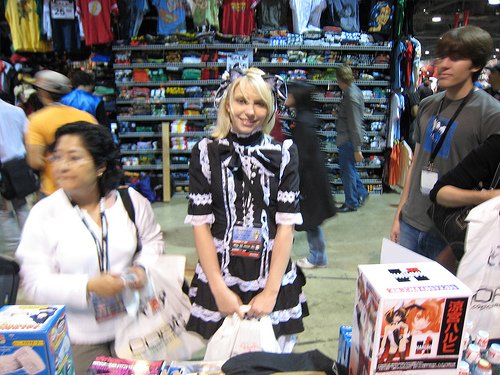We’re still here at Anime Expo in Long Beach, and it’s been a real blast. Monday is the last day of the show, so if you’ll be around, come on by! Just look for the really big banners featuring our official mascot, whose name is Megumi-chan, in case you were curious.
Japan is an expensive place, and travelling here can quickly add up to a lot of money. I once took my family to Kyoto for a few days and managed to spend enough for all of us to fly to Europe instead — ouch. However, there are still plenty of ways to make a trip to Japan affordable. First of all, be sure to make use of the Japan Rail Pass discount tickets, which let you go anywhere on Japan’s speedy bullet trains for a very affordable fee. (Poor Japan-bound gaijin like me don’t get to buy these, as they’re only for visitors from outside the country.) All Japanese cities have affordable youth hostels where you can stay for around $30 a night, more or less. You also might try what I’ve done in the past, staying in capsule hotels — you’re sure to have an unforgettable experience, sleeping in those tiny cubbyholes. Guidebooks like Lonely Planet are useful, but a word of warning: if you locate accommodations using these books, be prepared to find yourself staying at a traditional ryokan filled with other foreign tourists, all clutching copies of the same guidebook. Avoid this by trying a Japanese minshuku, a kind of Japanese-style bed-and-breakfast where you can enjoy the hospitality of the owner and meet locals also traveling on the cheap.
Everyone naturally views the world from the viewpoint of their own culture, and many people consider their country to be “best,” at least on some level. But while many Japanese view the world from the standpoint of their own culture, I don’t think I’ve met one who thinks that Japan is “#1” in the world. “Everyone knows that America is number one,” a guy drinking next to me once said. “Japan is number 81.” While he was making a joke about the international code used to call Japan, I think that certain Japanese, especially members of the older generation who experienced defeat by the Allies and the kids raised by them, have a bit of a complex about the U.S. and Europe, and naturally assume that their own culture is inferior to the greatness of the West. This is part of the reason why Japan’s government is happy to take its cues mostly from the U.S. and Britain, to introduce their own “Big Bang” banking reform program only after the U.K. rolled out their own program, or to name the retirement investment system used in Japan “the Japan 401(k).” Just once, it’d be interesting to see a major idea put forth by Japan’s government, which would be studied and adopted by the West, instead of the other way around.
I’d be remiss in my discussions about Japan if I didn’t bring up two core concepts any pop Japanoligist needs to know: tatemae and honne (TAH-tay- MAH-ae and HON-neh), two concepts which are woven into the fabric of Japan as a nation. Tatemae could be translated as the ideas expressed in public, or the way we pretend society is, while honne is the way we really feel, or the way the world really is. Often tatemae are the things you say to people in certain social situations, even though you don’t feel that way inside. When I see my English-bilingual wife talking with the other mothers at my daughter’s school, I can see some this idea in action: she has to hold her own opinions back much of the time and pretend to agree with the other mothers who have never been outside of Japan, lest she stand out too much. Tatemae can also exist in the society at large. For example, gambling is illegal in Japan, so you win “prizes” at Pachinko parlors, which you “sell” for money at small shops located conveniently next door. Prostitution is also illegal, yet there are “soaplands” where a beautiful girl will give you a full body wash in a bath (including one in Shibuya, located right behind a police station). And on Tokyo’s busy Kan-Nana Bypass, the speed limit is a meager 40 kph (24 mph), but anyone actually going that speed would surely cause an accident — so everyone speeds along at 90 kph (55 mph). Tatemae are the little white lies we live with every day, and honne are what is really in our hearts. Do you have tatemae and honne in your life?
















